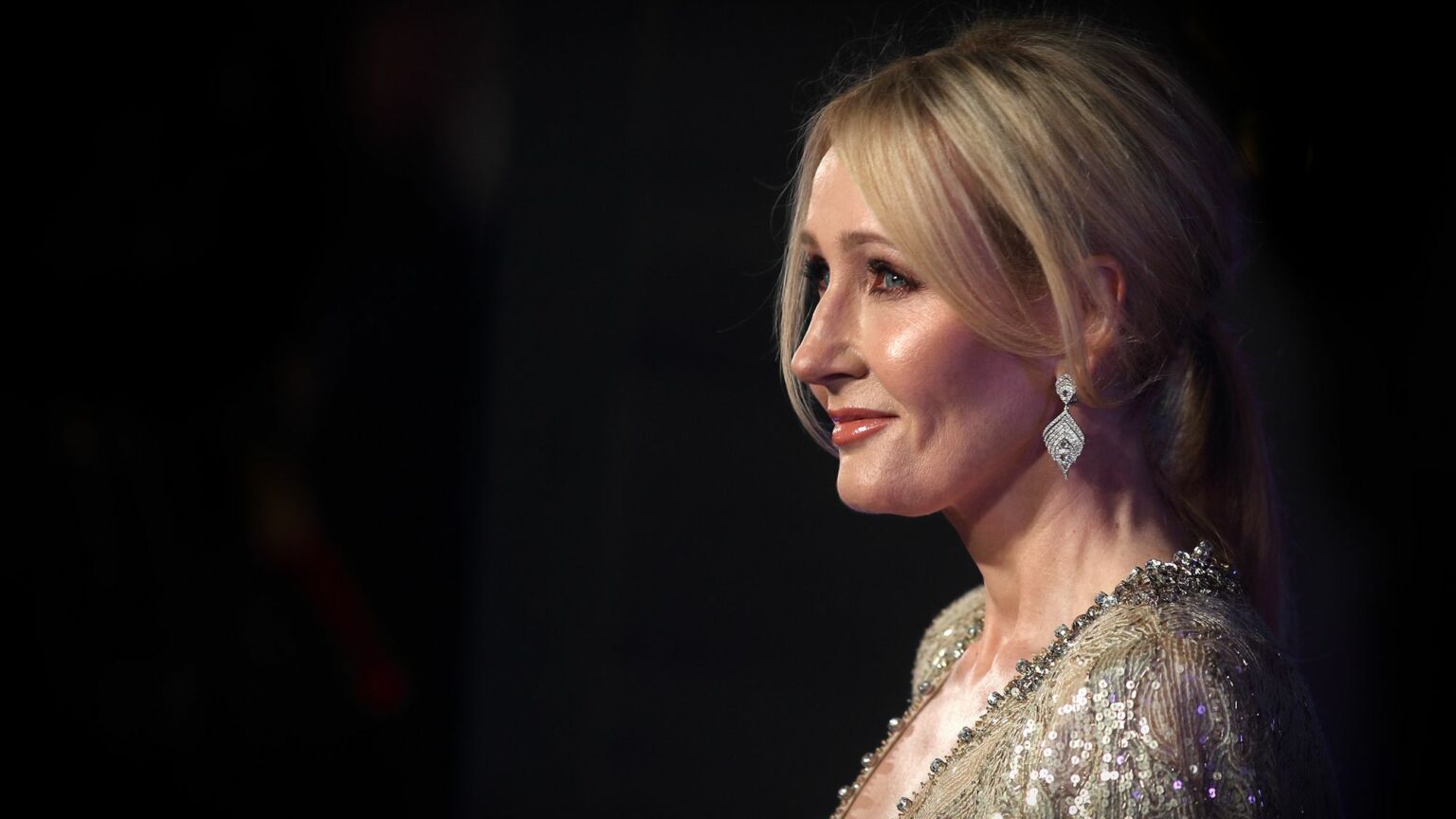
If you’d have said 10 years ago that JK Rowling would become the No1 hate figure of the cultural elites, people would have thought you were mad.
Until quite recently, she was a beloved children’s author, whose Harry Potter series is credited with turning a generation of young people on to literature. The only people who raged against her were ultra-religious Christians in the US, terrified that her ‘Satanic’ novels would teach their children the ways of witchcraft.
For most of her career, Rowling was embraced by the great and the good. After all, she was immaculately liberal-left. She voted Labour. She loved Barack Obama and Hillary Clinton. She voted Remain in the EU referendum. She was outspoken about feminism and women’s rights. What could she possibly be demonised for?
The answer? She believes in a thing called biological sex. She doesn’t believe that men can become women – views that are held by the vast majority of the population.

In 2018, her dark secret began to surface. Rowling had long been an active user of X, or Twitter as it was known back then. And it came to light that she had ‘liked’ a tweet describing transwomen as ‘men in dresses’. This was back when the trans issue had barely entered mainstream consciousness. So, when Rowling’s spokesperson claimed she had liked the tweet by accident, there was an element of plausible deniability.
Then, in 2019, Rowling made her views plain. This was the year that researcher Maya Forstater was forced out of her job at a think-tank due to her trans-sceptical opinions. Forstater took her case to court and eventually established that gender-critical beliefs must be protected from discrimination under the UK Equality Act. Rowling tweeted her support.
‘Dress however you please’, she said, ‘call yourself whatever you like. Sleep with any consenting adult who’ll have you. Live your best life in peace and security. But force women out of their jobs for stating that sex is real? #IStandWithMaya.’
This raised the hackles of some among Rowling’s audience. But it wasn’t until the next year that the campaign against her really took off.
In June 2020, Rowling took to Twitter again to mock the use of awkward and nonsensical ‘trans-inclusive’ phrases to describe women. Responding to a headline which used the phrase ‘people who menstruate’, Rowling quipped: ‘I’m sure there used to be a word for those people. Someone help me out. Wumben? Wimpund? Woomud?’

Later that month, she responded to this Twitter controversy with a lengthy essay on her blog. Here, she clearly – and compassionately – articulated her position on the gender issue. In it, she made clear that she has no problem with transgender people. But she is concerned that the attempt to erase biological sex threatens hard-won rights. She is worried about the effects trans ideology might have on female healthcare, education, child safeguarding, freedom of speech – all completely valid concerns, you might think.
She also made her sympathy towards those struggling with gender dysphoria abundantly clear:
‘I believe the majority of trans-identified people not only pose zero threat to others, but are vulnerable… Trans people need and deserve protection… I feel nothing but empathy and solidarity with transwomen who’ve been abused by men.’
How Tulsi and RFK can revitalise Trump’s campaign
Surely, now that Rowling had so eloquently and reasonably explained her position, the trans activists would stop attacking her? Maybe now they could all sit down and talk about this like adults? Obviously not.
The response was swift and unrelenting. Gender zealots dubbed her essay a ‘transphobic manifesto’. It was ‘problematic’ at best, and ‘hateful’ at worst, they said. People took it personally. Rowling had ‘failed them’. She had ‘betrayed the world she created’. She was ‘abusing’ her ‘platform’, they said.
She was even rounded on by the stars of the Harry Potter films – who, let’s be honest, would be nowhere were it not for Rowling. Daniel Radcliffe, aka Harry Potter, responded by passive-aggressively writing his own essay, declaring that ‘transwomen are women’. Emma Watson, who played Hermione Granger, put out a statement saying that ‘trans people are who they say they are and deserve to live their lives without being constantly questioned’. Rupert Grint (who played Ron Weasley), Bonnie Wright (who played Ginny) and Eddie Redmayne (who starred in the Fantastic Beasts spin-off franchise) also issued pro-trans statements.
Then came the boycotts. Outraged Potter fans urged one another not to buy any new copies of the books or movies, or to support any of Rowling’s other writing projects. Some particularly deranged people even posted videos of themselves online, burning their copies of the Potter books. All future additions to the franchise – from the Hogwarts Legacy videogame in 2022 to Harry Potter and the Cursed Child, a play in London’s West End – faced backlash in one form or another.
Then the Quidditch community turned against her. Yes, there really are people who play a version of the fictional, broomstick-flying sport from Harry Potter. Only without the flying or the magic. The International Quidditch Association announced in 2022 that it would be renaming Quidditch to ‘Quadball’, in large part to distance itself from Rowling.

In 2023, a Harry Potter panel at London Comic Con was cancelled after an LGBT charity complained about the ‘impact’ it might have on ‘trans individuals’.
Believe it or not, things only got more unhinged from there. When the trailer for the third and final Fantastic Beasts movie was released in 2021, Rowling’s name was mysteriously absent. Where movie trailers within the franchise would normally include the text ‘JK Rowling invites you’, it was replaced with ‘Warner Bros invites you’.
The Museum of Pop Culture in Seattle removed Rowling’s name from its Harry Potter exhibition. A London primary school changed the name of one of its houses, which had been named after Rowling. One particularly enterprising JK-hater went viral on TikTok last year for selling second-hand copies of the Harry Potter books, rebound to remove all instances of Rowling’s name. All totally normal behaviour…
JK Rowling has essentially become the trans movement’s public enemy No1. She has become the punching bag for activists who cannot brook even mild dissent, lest their bizarre ideology come tumbling down around them.
Of course, Rowling is pretty much uncancellable, given her enormous wealth. But the obvious intention of those who continue to agitate against her is to send a signal to everyone else. That dissent on gender will not be tolerated. That critics will be hounded and treated as pariahs.
Indeed, there have been countless cancellations of gender-critical people who lack Rowling’s enormous wealth and clout. Some have even been cancelled because they expressed their support for Rowling. In 2020, Scottish children’s author Gillian Philip was sacked by her publisher after she tweeted out the hashtag ‘ISTANDWITHROWLING’. Philip was hounded out of her industry for this one tweet. She’s now a lorry driver. That same year, an anonymous former Oxfam employee claimed that she was forced out of her job at the NGO for defending Rowling on an internal staff message board.
Even mentioning Rowling became verboten in some public spaces. In 2020, the women’s rights group Standing For Women paid for a series of posters and billboards to be set up across the UK in celebration of Rowling’s birthday. They stated, simply: ‘I heart JK Rowling.’ One, in Edinburgh Waverly train station, drew the ire of trans activists, who complained about the ad on the grounds it was ‘transphobic’. Network Rail swiftly removed it. Thus, Rowling had officially become like Voldemort, the villain of her own creation – she who must not be named.
And while Rowling isn’t going to be silenced anytime soon, the misogynistic bile that is constantly flung at her really is grotesque. Just look at the sort of insults she is bombarded with: ‘JK Rowling can suck my lady dick’; ‘JK Rowling is a massive cunt’; ‘JK Rowling is a whore’; ‘JK Rowling is a slag’; ‘JK Rowling is the human equivalent of a yeast infection. If you could do the world a favour and crawl back up whatever dried-up hole you were found in, the stench is absolutely unbearable.’
Rowling has received death threats. Rape threats. People threatened to send her pipebombs. Once, trans activists turned up outside her home to protest – and posted part of her address across social media. This is not ‘criticism’, as her media haters often like to portray it. This is a campaign of misogyny and menace.
Meanwhile, respectable institutions have only given credence to the idea she’s a horrible bigot. Earlier this year, the New Statesman branded her ‘Britain’s nastiest novelist’. Last year, to celebrate Pride Month, Oxfam International tweeted out a video that included an evil-looking ‘anti-trans’ cartoon character, who bore a striking resemblance to Rowling.
Police Scotland did something similar earlier this year, when it created a training scenario to help officers understand Scotland’s new Hate Crime Act. The session included a gender-critical character called ‘Jo’, who thought that trans people ‘all belong in the gas chambers’. Incidentally, Joanne Rowling, as is her full name, tends to go by Jo. She also lives in Scotland.
Thankfully, in real life, Rowling has been spared arrest for her gender-critical views. At least for now. On the day the new Hate Crime Act came into force, Rowling took to X to ‘misgender’ a series of transwomen – one of them a rapist who identified his way into a women’s prison – and challenged police to arrest her. This forced Police Scotland to clarify that people would not be arrested for misgendering.
Threats. Abuse. Demonisation. Being disowned by the people she made famous. A fight with the Scottish state. JK Rowling really has been put through it these past few years. And over what? To say the response to her views has been disproportionate is an understatement. She’s been cast out of polite society for holding what are really very moderate and mainstream opinions.
If you want to stump one of her critics, ask them to name a single ‘transphobic’ thing Rowling has ever said. They never can. She has never said anything remotely hateful. She has never wanted to strip trans people of their rights – their actual rights, that is, not the ‘right’ for men to burst into women’s changing rooms. Again, Rowling’s only concern is that gender ideology is a threat to the rights of women and children – a cause she has long championed, even before the trans issue hit the mainstream.
In her original essay, laying out her gender-critical beliefs, Rowling opens up about her own experiences with domestic abuse and sexual violence. As a survivor of both, she is particularly concerned about women’s refuges being opened up to men. In 2022, she announced she would be launching a women’s refuge centre, called Beira’s Place, in Edinburgh. A worthy endeavour, you might think. But trans activists attacked her for this, too – because the centre would only be for women, not men who think they’re women.
This is the rage against Rowling summed up. A prominent woman wants to stand up for her rights, for the rights of all women, particularly for those who have suffered at the hands of men. And for this, she’s a hatemonger.
Even now, with the landmark Cass Review vindicating many of Rowling and others’ concerns about gender ideology, even with more and more institutions realising they got the trans issue very wrong, her name remains mud.
JK Rowling’s transformation from national treasure to moral leper is perhaps the most grimly effective character assassination of the woke era. But it’s also a story of tremendous personal courage and resolve. She could have contented herself with her millions. She could have kept her mouth shut. But she didn’t. All the while, she has supported those who lacked the resources to defend themselves.
So here’s to JK Rowling – a witch who refuses to burn.
Lauren Smith is a staff writer at spiked.
Watch the video version below:





